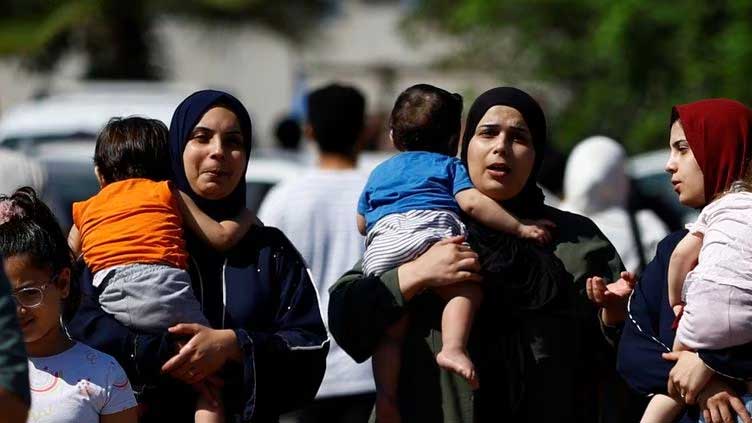Countries urge Israel to hold off on Gaza assault with civilians in firing line

World
Countries urge Israel to hold off on Gaza assault with civilians in firing line
JERUSALEM/NEW YORK/TEL AVIV (Reuters) - Countries urged Israel on Friday to hold off on plans for an all-out assault on northern Gaza, where more than a million civilians largely defied its order to evacuate before it goes after Hamas militants who slaughtered Israelis a week ago.
Hamas, which controls the densely populated Palestinian territory, vowed to fight until the last drop of blood and told residents to stay put after Israel said they should move to the south within 24 hours.
While some heeded the call to leave, by Friday afternoon there was little sign of a mass exodus.
"Death is better than leaving," said Mohammad, 20, standing in the street outside a building reduced to rubble in an Israeli air strike two days ago near the centre of Gaza.
"I was born here, and I will die here, leaving is a stigma."
With power supplies cut and food and water in the Palestinian enclave running short after a week of retaliatory air strikes and a full Israeli blockade, the U.N. said Gaza's civilians were in an impossible situation.
"The noose around the civilian population in Gaza is tightening. How are 1.1 million people supposed to move across a densely populated warzone in less than 24 hours?" U.N. aid chief Martin Griffiths wrote on social media.
White House national security spokesman John Kirby said such a huge evacuation was a "tall order", but that Washington would not second guess its ally's decision to tell civilians to get out of the way.
"We understand what they're trying to do and why they're trying to do this -- to try to isolate the civilian population from Hamas, which is their real target," he said on MSNBC.
The northern half of the Gaza Strip includes the enclave's biggest settlement Gaza City. The U.N. said it had been told that Israel wanted the entire population to move across the wetlands that bisect the enclave.
"Civilians of Gaza City, evacuate south for your own safety and the safety of your families and distance yourself from Hamas terrorists who are using you as human shields," the Israeli military said, accusing Hamas of hiding in and under civilian buildings.
Mahmoud Abbas, President of the Palestinian Authority that is a rival of Hamas, told U.S. Secretary of State Antony Blinken in Jordan that the forced displacement of Palestinians in Gaza would constitute a repeat of 1948, when hundreds of thousands of Palestinians fled or were driven from what is now Israel. Most Gazans are the descendants of such refugees.
Abbas called for aid to be allowed into Gaza immediately. Israel has said it will not lift its blockade until scores of hostages captured by Hamas are set free.
Blinken and Israeli Prime Minister Benjamin Netanyahu discussed providing safe zones in Gaza "where civilians could relocate to be safe from Israel's legitimate security operations," a U.S. state department official told reporters.
'I PROMISE YOU WE WILL WIN'
Israel has already responded with the most intensive air strikes of its 75-year conflict with the Palestinians. Gaza authorities say 1,799 people have been killed.
The Israeli military has not spelled out what sort of operation it is planning next but has pledged to operate "significantly" in coming days.
"We are fighting for our home. We are fighting for our future," Defence Minister Yoav Gallant said. "The path will be long, but ultimately I promise you we will win."
Israel says the horrific attack on its civilians means it must annihilate the militant group and others must get out of the way. Hamas tunnels, military compounds, senior operatives' residences and weapons storage warehouses were among 750 military targets struck overnight, it said.
The military wing of Hamas said the latest air strikes had killed 13 of the captives it brought back from Israel and that it had fired 150 rockets at Israel in response.
The United Nations said Israel's call for Gaza civilians to leave could not happen "without devastating humanitarian consequences", prompting a rebuke from Israel which said it should condemn Hamas and support Israel's right to self-defence.
A ground invasion of the narrow and densely populated Gaza Strip, home to 2.3 million people, poses serious risk, with Hamas threatening to kill its hostages.


